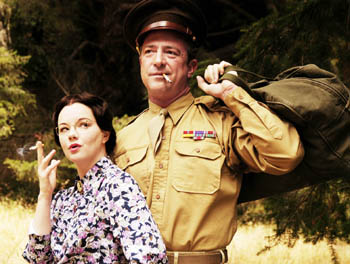![[Metroactive Stage]](/stage/gifs/stage468.gif)
[ Stage Index | Santa Cruz Week | SantaCruz Home | Archives ]

Loved You in 'A Boy's Life': Robertson Dean (right, with Blaire Chandler) looks decidedly De Niro-esque as Petruchio in 'Taming of the Shrew.' The Framing of the Shrewd SSC director Tim Ocel doesn't so much tackle a Shakespeare play as attack it from every possible angle--scouring every version he can get his hands on--to make it connect with new audiences By Rob Pratt Tim Ocel has a way with Shakespeare's comedies--and that's no middling skill. Late-night comics know that jokes or gags that bring audiences to tears one night can go stale in mere days. So what's the chance that a pun or a punch line crafted 500 years ago can still earn belly laughs from contemporary audiences? With Ocel directing, the changes are quite good. Over the course of four productions in Shakespeare Santa Cruz's festival glen, Ocel has earned raves for his staging of comedies that rely on inside jokes that were current shortly after the Renaissance and delivered in language--while loaded with wit and imagination--that hardly fits the construction and cadence of contemporary colloquy. His job this year, however, is even more difficult. Ocel takes on Shakespeare's The Taming of the Shrew, an examination of courtship and marriage with a dated view of a wife's duty to her husband. Shrew leads off this year's season of Shakespeare Santa Cruz, previewing Wednesday, July 21, at UC-Santa Cruz's Theater Arts Center. "We're placing it in a world that resembles the 1940s," Ocel says of his concept. "Petruchio and Lucentio are the new generation of men. They're the ones who will create postwar America and will lead the baby boom. They're sleeker and meaner. It's a little Rat Pack-y. With Petruchio, it's something about, 'What do I do now that the war is over?'" The point of the updated setting, Ocel says, is to bring the story a little closer to the experience of present-day theater-goers. The key, he says, is clarity--a lesson Ocel learned in directing opera. "I always try to make the story as clear and interesting as possible," he says. "With opera, people often can't get past the fact that the people onstage are singing. In Shakespeare, they can't get past the Elizabethan English." He also draws on his opera experience when it comes to the look of his Shakespeare productions. "Characters like Richard III live in a large public and private world and operate on a large emotional scale, like in opera," he says. "There's also a sense of artificiality. That can be an artistic device used to highlight what it is to be human." Ocel's quest for clarity begins even before the first rehearsal. For Shrew, Ocel has studied numerous versions of the play--older editions as well as new ones. As with many of Shakespeare's works, scholars do not have a definitive version of Shrew intact as the author intended it to be played. "The print type is one of the big things that change the play for me," he says. "I go from edition to edition. Some fonts let you see an entire thought even though it is across four lines. Some only let you see one word at a time. Then, when you read it in folio, it makes all the sense in the world. You can see the thoughts." Ocel brings that word-for-word, line-by-line analysis to the rehearsal process. The first thing he does with a cast, he says, it to work out exactly what's happening--literally in the words and stage directions and emotionally in the hearts and minds of the characters. "I don't work with the actors on any specific plan--just to make sure we know what the plot is," he says. "At least 50 percent of the time in rehearsal is, 'What are we saying?' You have to find out with the actor what the character is saying. A lot of times when I have not heard the play read aloud, when it comes time for rehearsal, the play reveals itself to me. "The play has two plots that are equally important," Ocel explains of the story in The Taming of the Shrew. "The Kate and Petruchio plot asks the question, 'Can you abuse someone into happiness?' If you have to tough-love someone into being happy, is that suspect or not? The Petruchio and Kate relationship is based on honesty and truth: the truth of what we can be and the truth of our potential. The only deception happens in the Bianca and Lucentio plot. "And I just realized after rehearsal a couple of nights ago that the play is actually a Roman comedy of masters and servants," Ocel adds. "It's like The Comedy of Errors, but with two sisters at the center."
The Taming of the Shrew previews begin Wednesday, July 21; the production opens the 2004 Shakespeare Santa Cruz season on July 24; it runs in repertory through Aug. 29. Tickets are $10-$40; call 831.459.2159. [ Santa Cruz Week | Metroactive Central | Archives ]
|
From the July 14-21, 2004 issue of Metro Santa Cruz.
Copyright © Metro Publishing Inc. Maintained by Boulevards New Media.
For more information about Santa Cruz, visit santacruz.com.